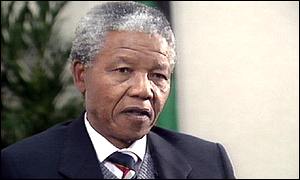JOHANNESBURG, (Reuters) – Former South African President Nelson Mandela has been admitted to hospital with a recurrence of a lung infection, the government said today, renewing concerns about the health of the revered anti-apartheid leader.
A statement said the 94-year-old Nobel Peace Prize laureate went into hospital shortly before midnight on Wednesday. It gave no further details other than to say he was receiving the “best possible expert medical treatment and comfort”.

Mandela, who became South Africa’s first black president in 1994, has been mostly absent from the political scene for the past decade, but remains an enduring and beloved symbol of the struggle against racism.
He is renowned at home and abroad for spending 27 years in prison fighting the last bastion of white rule in Africa and then promoting the cause of racial reconciliation.
Mandela has been frail and in poor health for several years.
He was admitted briefly to hospital earlier this month for a check-up and spent nearly three weeks in hospital in December with a lung infection and after surgery to remove gallstones.
It was his longest stay in hospital since his release from prison in 1990 after serving almost three decades for conspiring to overthrow the white-minority apartheid government.
Mandela has a history of lung problems dating back to when he contracted tuberculosis as a political prisoner.
As he has receded from public life, critics say his ruling African National Congress (ANC) has lost the moral compass he bequeathed it when he stepped down as president in 1999.
Under such leaders as Mandela, Walter Sisulu and Oliver Tambo, the ANC gained wide international respect as it battled white rule. Once the yoke of apartheid was thrown off, it began ruling South Africa in a blaze of goodwill from world leaders who viewed it as a beacon for a troubled continent and world.
Almost two decades later, this image has dimmed as ANC leaders have been accused of indulging in the spoils of office, squandering mineral resources and engaging in power struggles.
Mandela spent much of last year in Qunu, his ancestral village in the poor Eastern Cape province. But since his release from hospital in December he has been at his home in an affluent Johannesburg suburb, closer to sophisticated medical care.




